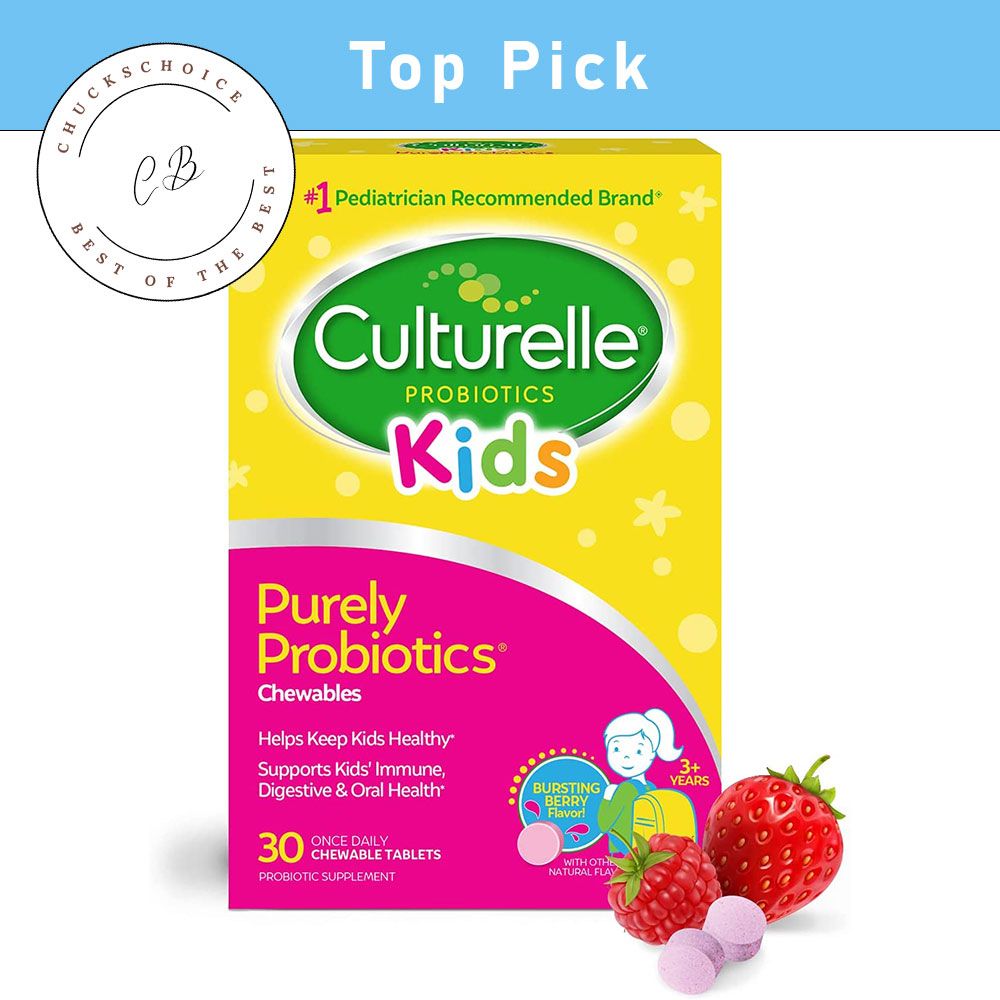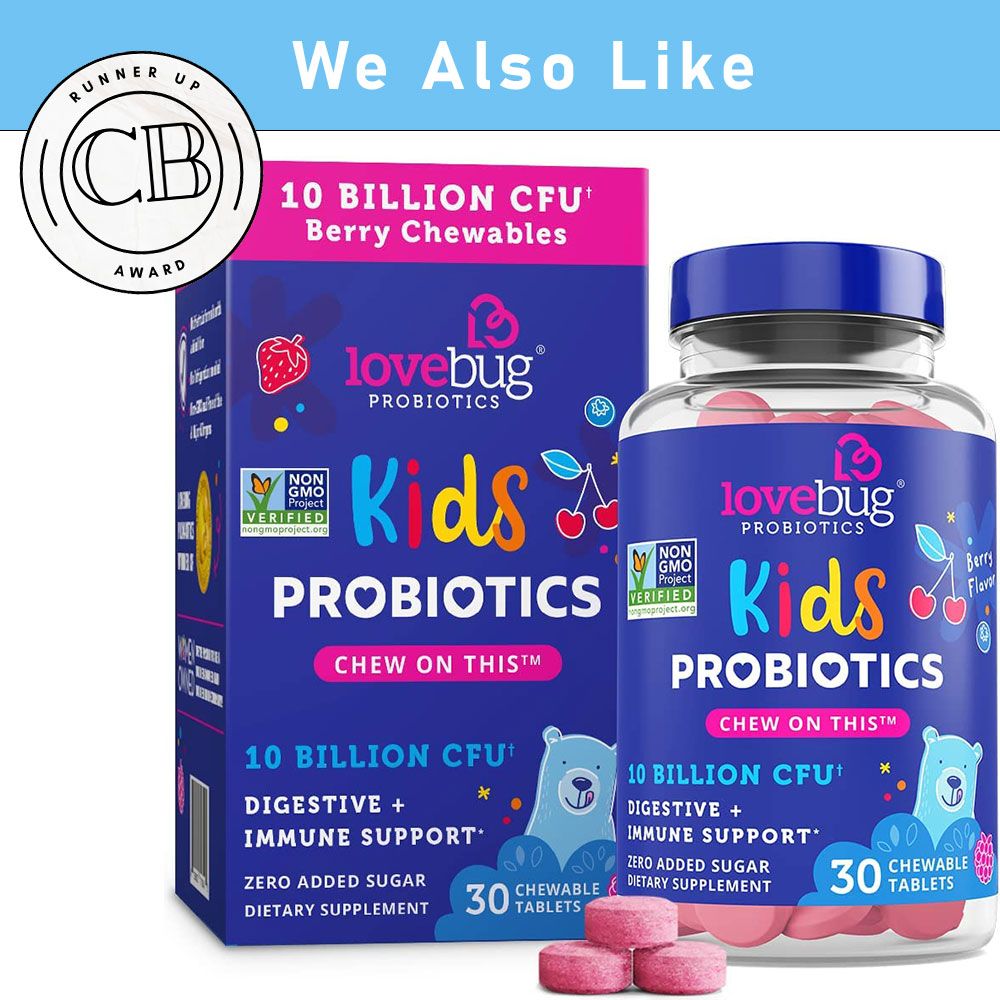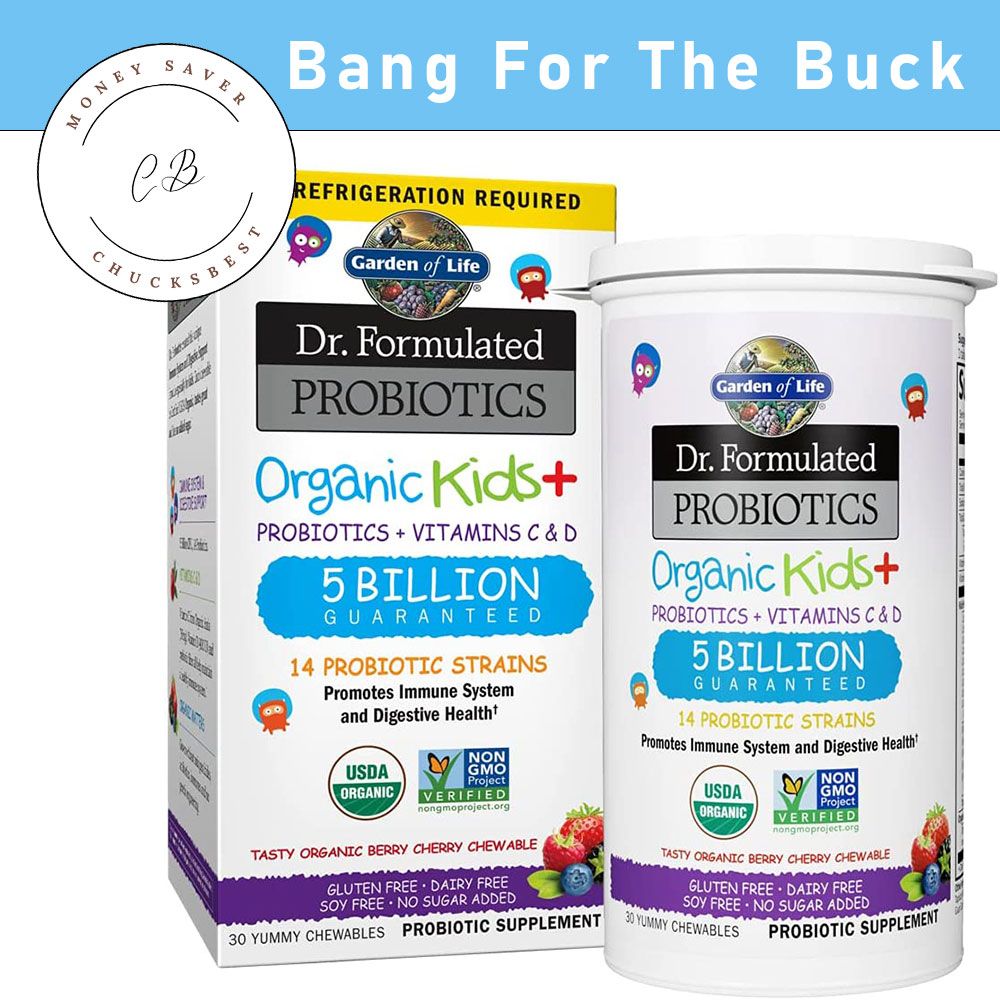Gaining a Boost From Nature's Superstar: Best Kids Probiotic of 2023
Kids need probiotics for the same reason adults do: to keep their gut healthy. A healthy gut is important for many things, including immunity, digestion, and even mood.

Why are probiotics for kids becoming so popular?
Because, in todays world keeping kids safe from infectious disease is top of mind for most parents.
Probiotics can boost your kid’s immune system and help them fight off infections.
Keep reading to discover more about our #1 recommended Kids Probiotic Supplement. Also, check out our FAQs and Buyers Guide below for helpful information.
To make it possible for us to do what we love, so you can easily get the items that you love, we may get a small commission if you click one of the affiliate links on our site.
Psst! Click here to read a special message from the Authors
Quick bit about us. We love simplifying your shopping experience! It's so much fun for us (and satisfying) that we can't stop. We want to provide you with the BEST product options and make your choice an easy one. What can we say… we also love doing research! So go ahead, call us nerds, geeks, Trekkies (ooh, Trekkie has a nice ring to it) but we’re doing our passion - and that’s good news for you! So we won’t waste your time (or money for that matter) giving you gobs of needless info or lists and lists of products. Nope! we’ll keep it to the most helpful information and simplify it to the top 3-5 best options. After all, we have to stay true to our name… this is ChucksBest - Shopping Made Easy.
How We Do It
We made you some real life easy buttons - You’re welcome!
How We Choose The Best Probiotic for Kids in 2023
If you're looking for a probiotic that's specifically designed for kids, you've come to the right place. Here, we've rounded up the best probiotics for children on the market. These picks are all shelf-stable, which means they don't need to be refrigerated, and they're free of common allergens like soy, gluten, eggs, and dairy.
Our team has researched more than 25 probiotic brands, done hours of research, and read through hundreds of reviews to put together the BEST list of probiotics for your kid, so your child can be happier and healthier!
Our goal (and frankly what we love to do) is to narrow it down to the best options, keeping it simple for you, so that choosing is as EASY as buying. From products that your wallet will love, to premium options (and some in-between). You’ll find something just for you!
Buyers Guide
So You Can Make The Best Purchase Decision Today!
When it comes to keeping kids healthy, one area that’s often overlooked is gut health. But the gut plays a crucial role in immunity and overall health for your kiddo, so it’s important to make sure it’s in tip-top shape.
One way to do that is by giving kids a probiotic supplement. Probiotics are living microorganisms (live bacteria and yeasts) that are good for our digestive system. They are available in supplement form, but can also be found in some foods like yogurt and sauerkraut.
There are many different probiotic strains, and each offers different benefits. Some strains may help relieve diarrhea, while others may help boost the immune system.
Pediatricians often recommend probiotics for children, as they can help with a variety of gastrointestinal issues, like irritable bowel syndrome. They can also come in handy when our kids are taking antibiotics or experiencing digestive issues.
One billion live bacteria per serving is a good starting point for kids. There are a few other things to consider when choosing a probiotic for your kiddo. The first is the strain of bacteria. Lactobacillus reuteri and Lactobacillus Rhamnosus LGG are two good options. Finally, consider the reason you're giving your child a probiotic. Is it for constipation relief? To help with tummy troubles? Or just to promote good digestion? Once you've considered all of these factors, you can choose the best probiotic for your child.
If you're considering a probiotic supplement for your child, you might also want to consider adding some PRE-biotic foods to their diet. Prebiotics are a type of dietary fiber that act as fuel for the beneficial bacteria in our gut. By including prebiotic-rich foods in your kids diet, you can help make the probiotic work more effectively.
Some good sources of prebiotics include oats, bananas, berries, beans, onions, and garlic. All of these foods are fairly easy to incorporate into your kiddos diet and can make a big difference in their gut health. So if you're looking to give your child a little extra boost of gut-friendly bacteria, be sure to add some prebiotics their diet as well.
Probiotics are generally safe for most people, but it’s always best to talk to a pediatrician before giving them to children.
If you or someone you know is expecting - check out this article for pregnant women.
RECOMMENDATIONS

Why We Like it
- Thousands of customers have rated this probiotic as one of the best tasting berry flavored chewable. It's also free of gluten, dairy, lactose, added colors, preservatives, yeast, egg, and soy.
- Comes in both chewable form and powder (packet) form. You can select before purchasing which "style/form" you prefer.
- This product is shelf stabile so refrigeration is not needed. (It is however recommended that you be home to receive the package to avoid unnecessary exposure to heat.)
- Not only has this product been clinically tested and proven effective, but hundreds of Amazon product reviews include a 5 star rating for the positive results after a few days of use. Some users experienced results within the first 24 hours.
What you should Know
- For ages 3 and up
- The key ingredient / probiotic Strain in Culturelle Kids Chewable Probiotic is Lactobacillus rhamnosus GG (LGG)
- Probiotics should be taken daily for full effectiveness.
- Total servings/count of chewable tablets (and powder packets) is 30 per box.
Why We Like It
Customers have rated this probiotic as one of the best tasting probiotics on the market (next to Culturelle Kids). Children give this probiotic a 9 out of 10 for flavor.
Lovebug probiotics is loaded with over 10 Billion CFU (colony forming unit”, or number of cells). That's better than a pot of gold!
This probiotic is free of the 8 major allergens; and is also vegan friendly. No refrigeration needed
What You Should Know
It has the benefit of multi-strain support with added fiber. Oftentimes, diversity in strains can help promote a more balanced & healthy digestive system for your child and the added fiber helps to feed the probiotics for multifaceted support!
This probiotic is GMO Free, with no artificial flavors, or added sugars.
Total servings per bottle is 30.
Why We Like It
Is available in 3 flavors: Berry Cherry, Watermelon, and Strawberry Banana.
Can be shipped in shelf stabile form or refrigerated package.
Contains over 5 Billion CFU (colony forming unit”, or number of cells) per serving. Guaranteed!
What You Should Know
This probiotic is packed with good stuff! 30mg of Vitamin C (from Organic Amla Berry) and 400 IU of Vitamin D all in one tablet. But they don't stop there, it also has organic Acacia fiber and whole Cranberry PREbiotics added in, which helps to feed the good bacteria in your gut and keep your digestive system functioning properly. It's also gluten free, soy free. and dairy free.
Garden of Life kids probiotic has 14 strains of probiotics. Here are just a few: Lactobacillus acidophilus, gasseri, paracasei, and plantarum as well as Bifidobacterium (Bifidobacteria) lactis, breve, infantis, and bifidum


FREQUENTLY ASKED QUESTIONS
The Best Answers For The Right Questions!
Q. What's the best probiotic for kids?
A. There are many types and forms of probiotics on the market. Liquid probiotics, probiotic powder, gummies, etc. But when choosing a probiotic for your toddler, you want to make sure it has the right strain(s). Look for probiotics that have the Lactobacillus Reuteri or Lactobacillus rhamnosus GG strains. These are 2 of the best probiotics for kid's immune health.
These strains have also been shown to be effective in treating diarrhea and other gastrointestinal issues in toddlers.
Probiotics may also help boost your toddler's immune system. A 1 billion live probiotic cell supplement is a good starting dose for toddlers. If you're looking for a stronger dose, a 5 billion live probiotic cell supplement may be best for your toddler.
Q. Do kids probiotic gummies really work?
A. Probiotic gummies are a popular way to take probiotics, but do they really work? We asked a pediatrician if chewables are good way for kids to get their daily probiotic.
"Probiotics are microorganisms that, when taken in the right amount, can have health benefits," says pediatrician Dr. Claire McCarthy. Gummies are a chewable way for kids to take a probiotic, that kids may find more palatable than a pill. So, do they really work? "They may help some kids, but there's no guarantee," says Dr. McCarthy. If your child is struggling with gut health or immunity, talk to your pediatrician about whether or not a probiotic gummy is right for them.
Q. Can a child have too much probiotics?
A. Yes, a child can have too much probiotics. Probiotics are live microorganisms that are intended to maintain or improve the health of the user. They are commonly found in yogurt and other fermented foods, as well as in dietary supplements.
While there are many potential health benefits of probiotics, it is important to be aware that taking too much of them could cause some minor problems.
The most common side effect of taking too many probiotics is digestive upset, such as bloating, gas, and diarrhea. Probiotics may also trigger allergic reactions in some people.
We suggest you speak with a healthcare provider before giving probiotics to children, and to start with a lower dose and increase gradually as needed.
Q. What are the signs your toddler or kid needs probiotic supplements?
A. If your kid is having digestive issues, it might be time to consider probiotics as a way to improve digestive health and create healthy gut bacteria. Probiotics may help a variety of gut issues.
1. They have frequent stomachaches or indigestion.
2. They have trouble digesting certain foods.
3. They have loose stools or diarrhea.
4. They have constipation.
5. They are irritable or cranky after eating.
If you think adding probiotics to your child's diet might help your Kiddo, talk to their doctor about adding a probiotic supplement.
Q. How long does it take for a probiotic to work?
A. If you're wondering how long it will take for a probiotic to work in your child's system, the answer depends on a few factors. Probiotics can help regulate digestion, support the immune system, and even improve behavior in kids. But finding the right probiotic food or supplement, and giving it time to work, is key.Some people may feel results from a probiotic almost immediately, while others may not notice any changes for several weeks. Because probiotics have live organisms that need time to colonize in the gut.
Q. What foods have natural probiotics and prebiotics and support a healthy gut?
A. There are a variety of foods that contain good healthy bacteria. Besides taking a daily probiotic supplement, prebiotics and probiotics are found in fermented foods such as yogurt, cheese, and sauerkraut. Probiotics come in many forms and there are a lot of benefits of probiotics for children that can help kids with things like digestion and absorption of vitamins and nutrients. The best probiotic strains (like Lactobacillus reuteri) can be found in probiotic foods naturally, but the best way to absorb probiotics is through probiotic supplementation. They are safe for kids and are the best way to achieve the benefits of probiotics for kids.
Q. What are the benefits of probiotics for children?
A. There are many benefits of probiotics for children. Probiotics can help prevent diarrhea, constipation, and other gastrointestinal problems. They can also boost the immune system and help protect against allergies and respiratory infections. Probiotics may also improve mental health by reducing anxiety and depression.
Q. What are the main types of probiotics?
A. There are several different types of probiotics, but the most common ones are lactobacillus plantarum, lactobacillus brevis, and leuconostoc mesenteroides. Each one of these probiotics has different benefits for your health.
Lactobacillus plantarum is a common probiotic that can be found in many fermented foods. It is known for its ability to help with digestive issues and boost immunity.
Lactobacillus brevis is another common probiotic that is often used to treat diarrhea and other gastrointestinal issues. It can also help boost your immune system.
Leuconostoc mesenteroides is a less common probiotic, but it has been shown to be effective in treating skin conditions like eczema and psoriasis.
Q. Do probiotics relieve symptoms like constipation and bloating?
Constipation is a common digestive problem that can be caused by a variety of things, including a lack of fiber in the diet and not drinking enough water. Probiotics can help relieve constipation by increasing the good bacteria in the gut, which helps to break down food and move it through the digestive system more efficiently.
Bloating is another common digestive problem that is often caused by gas buildup in the intestines. Probiotics can help relieve bloating by breaking down gas-producing foods more effectively and reducing intestinal inflammation.
Q. What are the best probiotics for toddlers?
A. The first thing to consider is what type of probiotic you want to give your toddler. There are many different strains of probiotics, so you'll want to choose one that is specifically designed for toddlers. Look for a probiotic that contains Lactobacillus or Bifidobacterium strains, as these are the most beneficial for young children.
Another thing to consider is the dosage of the probiotic. Some products contain more live cultures than others, so you'll want to choose one that has a high number of live cultures per serving. This will ensure that your toddler gets enough beneficial bacteria.

Key Takeaway: Best Kids Probiotics
In conclusion, it is evident that probiotics are beneficial for gut health, particularly in young children. The longer your child takes a probiotic supplement, the stronger and more diverse their microbiome becomes. This diversity is key for a healthy gut and overall immune system. Therefore, parents should consider incorporating a daily probiotic into their child's routine, especially if they are prone to gastrointestinal issues.
No matter which of the top 3 probiotics you choose, you’ll find one to meet your needs.
And that’s it! Now you can feel more confidant as you shop and make a purchase decision today! It gives us great satisfaction to simplify the shopping experience and make it more enjoyable for you! Thank you for visiting our site!




